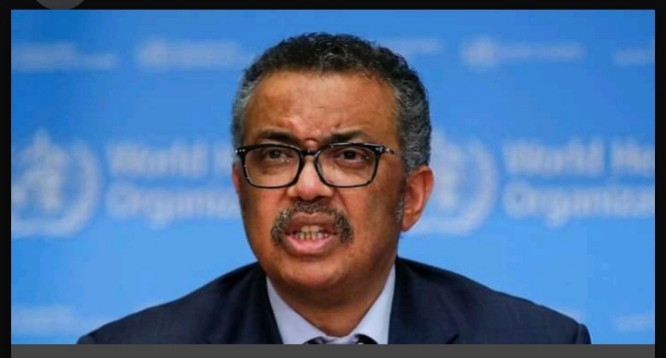The Director-General of World Health Organization (WHO), Dr Tedros Adhanom Ghebreyesus has revealed that the loss of United States funding, combined with some other countries, will cause the organization to face a salary gap for the next biennium of more than US$ 500 million.
Ghebreyesus who disclosed this at the 42nd meeting of the Programme, Budget and Administration Committee of the Executive Board on Wednesday said WHO current financial situation would be much worse, $300 million worse.
Recalled that US President, Donald Trump halted nearly $500M annual funding to WHO, for the United States to review alleged collusion of the Heath Body with China to cover up early scale of Covid-19 outbreak; that resulted into a 20-fold toll of the virus globally. The DG pressed further that due to this loss of funding the organization proposed a reduced budget of US$ 4.2 billion for the 2026-2027 biennium, a 21% reduction on the original budget of $5.3 billion, approved US$ 4.9 billion, but still revised it to $4.2 billion to align with the current reality.
The DG pressed further that due to this loss of funding the organization proposed a reduced budget of US$ 4.2 billion for the 2026-2027 biennium, a 21% reduction on the original budget of $5.3 billion, approved US$ 4.9 billion, but still revised it to $4.2 billion to align with the current reality.
According to him, “Some Member States have suggested that the US$ 4.2 billion budget may be too ambitious, given the current landscape for resource mobilization. We understand that point, but $4.2 billion dollars, or $2.1 billion a year – is not ambitious.
“For an organization working on the ground in more than 150 countries, with the mandate and mission that Member States have given us, an annual budget of US$ 2.1 billion dollars is very modest, to say the least. “At current exchange rates, the HUG hospital here in Geneva operates on the same budget – slightly larger than WHO, in fact. How can WHO be expected to serve the whole world on the same budget as one hospital in a mid-sized European city?
“At current exchange rates, the HUG hospital here in Geneva operates on the same budget – slightly larger than WHO, in fact. How can WHO be expected to serve the whole world on the same budget as one hospital in a mid-sized European city?
‘Especially at a time when many countries are facing severe disruptions to health services due to a sudden and sharp drop in official development assistance. We see people missing life- saving treatment, increased out-of- pocket health spending, closures of health facilities and job losses for health workers.
“These countries – and their people – need a strong WHO now more than ever. I hope you agree with me. And yet, our reduced budget means we will not be able to support them to the extent they need”. Ghebreyesus lamented that a $4.2 billion budget means some extremely difficult choices for the Secretariat. “As you know, weve been engaging in a major structural realignment, guided by in-depth analysis of priorities, and trying to use the current crisis as an opportunity for the Organization”.
Ghebreyesus lamented that a $4.2 billion budget means some extremely difficult choices for the Secretariat. “As you know, weve been engaging in a major structural realignment, guided by in-depth analysis of priorities, and trying to use the current crisis as an opportunity for the Organization”.
The DG further revealed that the organization have been exploring cost- saving measures including relocating some functions, offering early retirement to eligible staff, and shrinking footprint. “We expect these measures will produce more than $165 million in savings by the end of the year.
“In short, we are leaving no stone unturned in our efforts to improve cost efficiency. But even so, the hard truth is that we need to reduce salary expenditures by 25%.  “That does not mean that we necessarily cut 25% of staff across the Organization. But make no mistake: we are saying goodbye to a significant number of highly experienced, and dedicated members of our workforce. That means careers interrupted and lives disrupted.
“That does not mean that we necessarily cut 25% of staff across the Organization. But make no mistake: we are saying goodbye to a significant number of highly experienced, and dedicated members of our workforce. That means careers interrupted and lives disrupted.
“In order to support staff during this difficult period, we have introduced a range of support mechanisms, and we are committed to supporting the mental health and well-being. We anticipate that the most significant staff reductions will be at headquarters, while regional offices will also be affected to varying degrees”.
The DG announced the makeup of the organization new executive management team, which will take effect from 16th of June. “The new team has been chosen after very careful consideration, and to ensure gender balance and geographical representation.
“This was, as you can imagine, an extremely difficult and painful decision for me, as it is for every manager in our organization who is having to decide who stays, and who goes.  Ghebreyesus thanked the outgoing members of senior leadership team for their dedication, leadership and service while wished them every success in the next chapter of their lives and careers.
Ghebreyesus thanked the outgoing members of senior leadership team for their dedication, leadership and service while wished them every success in the next chapter of their lives and careers.
He said, I’m confident that this new team, under the restructured organization, is best positioned to now guide WHO as we face the challenges of the coming years.
The DG emphasized that the focus on strengthening the country offices is unchanged, “although we plan to close some offices in high-income countries that no longer need in-country support.
“But let’s be clear: reducing the scale of our workforce means reducing the scale and scope of our work, where necessary, adjusting the targets of the 14th General Programme of Work.
“That, I think, also means difficult choices for you, our Member States, because each of you, and rightly so, have your own needs and priorities. But to be blunt, we cannot do everything.
“Time and again, Member States have emphasized importance of maintaining our focus on core functions. While seek your support in refraining from adding more work at a time when we are scaling down to ensure we deliver on those core functions”, Ghebreyesus said.
$500m salary gap as WHO sets to reduce staff, cut expenditures
Please login to join discussion











